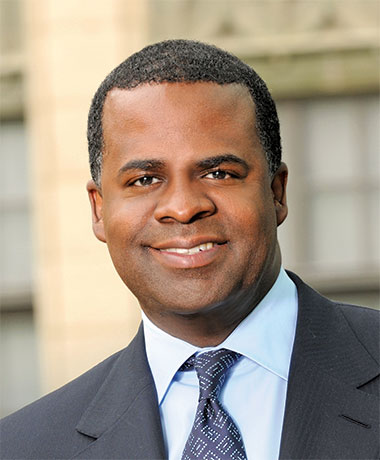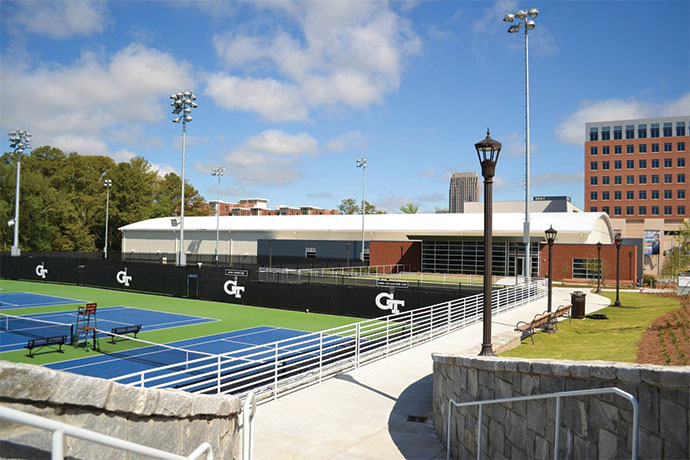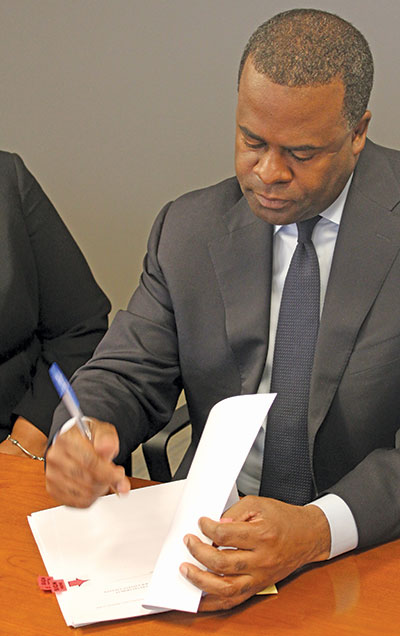Elected the 59th mayor of the City of Atlanta on January 4, 2010, Kasim Reed wasted little time in elevating the stature of Georgia’s capital city.
He hired more than 700 new police officers for the city of 432,427 residents, re-opened all of the city’s youth recreation centers, and improved core municipal services such as fire-rescue response times and sanitation operations.
After beginning his term facing a $48-million budget shortfall, Reed has presided over three years of balanced budgets without raising property taxes, increased cash reserves from $7.4 million to more than $126 million, and implemented a series of reforms addressing the city’s $1.5-billion unfunded pension liability.
But he may have saved his biggest act for his fourth year in office. On April 4, he led the Invest Atlanta board of directors to approve funding for a new NFL stadium for the Atlanta Falcons. By an 8-1 vote, the board approved a bond inducement of $200 million, to be paid with revenue from the city’s hotel-motel tax, to help fund the $1-billion retractable-roof stadium that will replace the Georgia Dome as home of the Falcons.
The remaining cost of building the new stadium will come from the Arthur Blank-owned Falcons and other private funds.
“We are going to build a new best-in-class facility that will help us attract new events and keep the Atlanta Falcons downtown for the next 30 years,” said Reed, who serves as chairman of the Invest Atlanta board. “I am pleased that the Invest Atlanta board approved the bond resolution for a new stadium by 8-1, following a very strong 11-4 vote of confidence in this project by the Atlanta City Council in March. The new stadium will be a key anchor for the city’s $10-billion annual tourism and convention business, and I look forward to the economic development activities that will occur in the nearby historic Vine City, English Avenue and Castleberry Hill neighborhoods as a result of this transaction.”
Invest Atlanta also approved $15 million in Westside Tax Allocation Funds for economic development projects that leverage private-sector investment in the English Avenue, Vine City and Castleberry Hill neighborhoods that surround the site of the new stadium.
The Arthur M. Blank Family Foundation is also contributing $15 million toward community enhancements.
The new stadium, to be built adjacent to the Georgia Dome, is expected to take three years to build and create 3,000 construction jobs. The complex is slated to open in time for the 2017 NFL season. The Dome has served as the Falcons’ home since 1994.
In a wide-ranging interview with Site Selection, Mayor Reed said the new stadium puts Atlanta once again in the running to host a Super Bowl — something the city hasn’t done since 2000.
SITE SELECTION: What is the long-term impact of the city’s new stadium deal with the Falcons?
MAYOR REED: One of the two biggest businesses in Georgia is our convention and visitor business — with 229,000 jobs and very nice levels of jobs. That business is core for us. We compete against leading cities in the U.S. for conventions every day. It is my job to make sure that Atlanta remains the dominant city in the Southeast. We can’t wait for other cities in the South to catch up with us. We have to make sure we have new attractions. We just had a conversation about that. This is the first time in the history of the Final Four that the Division I, II and III basketball championships are all being played in the same city. We get to market the fact that we are one of the few cities in the U.S. to handle an Olympic Games. When we are done, we will have one of the best stadiums in the U.S. It will give us a capability to house domed events and open-air events. We are in competition for a Super Bowl, a Major League Soccer team and the college football playoff games.

‘It is my job to make sure that Atlanta remains the dominant city in the Southeast.’
All of those factors are reasons why I wanted us to have a new facility. New facilities attract best-in-class events. I believe it was important to keep the football team in downtown Atlanta. Every mayor in the U.S. who has played this game has come out on the losing end of the transaction. The Cowboys now play in Arlington. I can’t believe the folks in Dallas feel it is best that the 80,000 folks who go to watch NFL games now go to games in Arlington. The San Francisco 49ers will play in Santa Clara. And the mayor of Sacramento is trying to keep the NBA’s Kings in Sacramento.
Our deal is a 20-percent local investment and 80-percent private investment. It keeps the team in downtown Atlanta for 30 years. It passed with an 11-4 vote of the Atlanta City Council. Some $35 million to $40 million will go into impacted neighborhoods. It will significantly enhance our competitive position in a very competitive industry. We hosted more than 39 million visitors in Atlanta last year. New York City hosted 50 million visitors. We will soon host more than 40 million guests and visitors here each year. Our airport already handles more than 95 million visitors a year.
SS: You recently announced a plan to put together a global exports strategy for the City of Atlanta. Could you elaborate on that?
REED: We have the third largest concentration of Fortune 500 companies in the U.S. We have unparalleled international connectivity and transactions, especially when you consider that we are home to the corporate headquarters of Coca-Cola, The Home Depot, United Parcel Service and many others. But our mid-sized and mid-level businesses are not comfortable moving into the import-export space. If you are an entrepreneur, what can we do to get you comfortable taking your company to international markets?
We are partnering with the Brookings Institution to help prepare our smaller businesses to enter the global markets. That is where most of the economic growth of the future will occur. Growth will be mostly in other parts of the world for those firms. They have to have a partner. We are trying to build an internal capacity so that we can be the guide for those companies. Brookings is working to show us how we can be the best in class at that. That will give us a tremendous advantage over other cities. Few cities can compete with us.

We are working to become the logistics hub for the Western Hemisphere. If anyone wants to know what our goal is, that’s what it is. We host 15 percent more guests than the Beijing airport does. Last year Delta had one of its strongest performing financial years. Now we are developing our air cargo capability. We have seven of the top 10 leading air cargo carriers in the world. British Airways is now basing its air cargo operations here rather than in New York City. The Port of Savannah is the fastest growing port on the Eastern Seaboard. It is moving quickly to accommodate an expanded Panama Canal.
We think that all of these factors — along with our low cost of living and well-educated population with 57 colleges and universities anchored by Georgia Tech — give us a unique advantage.
SS: Atlanta recently landed the North American headquarters of Porsche and is reportedly in the running to secure a 100-job operations center for Volkswagen. How close is Atlanta to landing other large corporate facility deals?
REED: We are absolutely very close. I know that because I am involved in four to six big deals right now. As we speak, these are 200-plus-employee operations and they are looking at us right now. Porsche is here; Assurion has expanded here; Baxter is coming to the region. People are feeling very bullish on Atlanta. The official bird of Atlanta — the construction crane — has returned to the city.
SS: What is the global brand of Atlanta? What do you want it to be?
REED: What I want it to be is that Atlanta is the most important city in the South. It has the best international connectivity and the highest standard of living for the money. Capital investment is highly valued and treated well, and it is a low-tax government. We are at $3 billion as a state in the film and TV business. We are in the $1-billion space in this city alone. I closed the recruiting of Screen Gem Studios on an old amusement park lot at Lakewood. Tyler Perry, CNN, TNT and all of the Turner Broadcasting businesses are located right here in Atlanta.
SS: How does the city get the Atlanta Public Schools scandal off the front page and the focus moved on to other topics that portray Atlanta in a more favorable light?
REED: We have to work through the APS cheating scandal and discuss what it is in a full and open and transparent fashion. We have to acknowledge how terrible it is and recognize we must change. I do not have control of the school system. We have done a series of hard things. We have recruited a former Fortune 1000 CEO to take over the Atlanta school system, get it off probation and get school board members who are reform-minded. We are not running from it, but changing the harm that was done to our kids. I have received a number of calls about it. The story is a terrible one. You get through tough times by going through them without excuses and understanding what happened and then changing it.

Mayor Reed is adept at reaching out across many channels, whether he’s (clockwise from upper left) appearing on national media, breaking new ground (at Porsche), cutting ribbons or listening to his city’s future leaders.
SS: How have you been able to forge such a close and cooperative relationship with Georgia Gov. Nathan Deal?
REED: I respect Gov. Deal and I understand his job. I spent 11 years of my life as a member of the Georgia Assembly. We have the opportunity to serve in significant jobs at the same time. If we have disagreement on key matters, the people of the state are harmed. What the governor and I do is work on things that we agree on, and when you take that approach, there is plenty to work on. You can generate authentic benefits for the people of Atlanta and the people of Georgia.
SS: How does your friendship with President Obama help Atlanta?
REED: I was an early supporter of the President when he ran in 2008. I was one of his most ardent supporters in his re-election campaign in 2012. I made more than 40 TV appearances on behalf of him and his re-election effort. He has been an amazing partner for cities. The City of Atlanta has received more than $200 million in direct investments from the President’s initiatives. It is difficult to not appreciate that.
SS: What would you like your legacy to be?
REED: I want them to say that he left Atlanta far stronger than he found it and he made the City of Atlanta the most important city in the Southeast.

